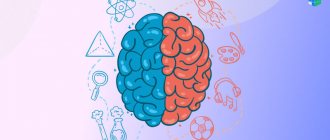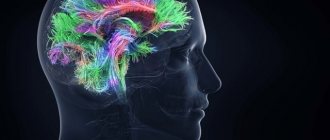Modern science and social science are actively engaged in the study of the biological and social components of man. The biological characteristics of a person, like the social ones, consist of a number of features that equally influenced his evolutionary development.
From this it proceeds that the biological and social in a person form an equal ratio, that is, a person is a biosocial individual and has a dual nature, being a symbiosis of nature and the social system.
Next, both types of human characteristics and their examples will be briefly discussed.
Man as a biological and social being
To study the issue of biological or social dominance in humans, there are two directions: panbiologism
, insisting on the biological uniqueness of each organism (set of genes, character, temperament, formation of appearance and physical characteristics) and
pansociology
, advocating biological equality and putting social development to the fore (manifested through the influence of upbringing, religion, education, formation of talents on a person, personal qualities and perception of the world).
According to philosophical teachings, man is a spiritualized physicality and, to the same extent, a body endowed with soul and mind. According to this, man is the earthly embodiment of the spirit, forced to study, work and satisfy physical needs for survival in nature and society.
At the same time, a person does not lose his individuality and character traits that make him a separate person from society. Thus, man is a unique entity that contains both the earthly and the spiritual in equal measure.
The structure of socio-psychological properties of personality
Definition 2
Socio-psychological properties of a person are a complex of characteristics inherent in a person, each of which has its own internal structure, including certain aspects.
Internal structure of socio-psychological properties of personality:
- The psychological side of personality - reflects the specifics of the functioning of mental properties, processes and states of a particular person.
- Mental processes are certain mental phenomena that are aimed at ensuring primary awareness and reflection by a person of the impact of the surrounding reality on him.
- Mental properties are the most permanent and stable characteristics of a person, which provide her with the necessary level of behavior, actions and activities characteristic of other members of society. The mental properties of a person correspond to the norms and rules established in a particular society.
Note 2
The main sides of the personality are: the ideological side and the socio-psychological side.
The worldview side of a personality is aimed at a person’s reflection of socially significant characteristics and qualities that allow him to occupy a worthy place in a particular group and society as a whole.
The socio-psychological side of personality is aimed at reflecting the basic characteristics and qualities that allow a person to fulfill certain social roles and occupy a position among other members of society.
Main factors of human anthropogenesis
Anthropogenesis is the process of human development that is directly influenced by biological and social factors of development.
The biological properties of evolution affect all representatives of living nature, including humans. These include: variability of heredity, struggle for survival, mutations and genetic drift, natural selection.
Social factors include: culture, work, thinking, the formation of moral qualities, the development of social consciousness and speech.
The most important engine of evolution is labor activity
- the ability to create tools for work belongs purely to humans, while animals use auxiliary means for hunting and building housing.
If biological developmental characteristics are transmitted hereditarily, then the acquisition of social ones occurs only during education and upbringing.
Self-awareness and self-realization
Self-awareness and self-realization are important “building blocks” of a person’s social essence. Self-awareness is the ability of an individual to understand himself as a person, evaluate his capabilities and abilities, understand and predict how certain actions will be perceived by others, and also take responsibility for his own decisions and actions. It is self-awareness that determines how successfully a person can interact with other members of society.
Self-realization is the process of a person realizing his potential, achieving life and simply important goals. American psychologist Abraham Maslow believed that the need for self-realization is one of the highest human needs (along with self-actualization and self-development). He gave the following definition: self-realization is the fullest use of all talents, abilities and available opportunities to carry out personally significant activities.
Biological characteristics of humans
As a biological individual, a person has characteristics that make him similar to other species: the desire to procreate, differences in age and sex, the need for nutrition, breathing and sleep, heredity, the presence of reflexes and instincts, stereoscopic vision, a similar internal structure of the body, the ability to adapt to different environmental conditions.
In addition to general biological features, there are important distinctive features:
- the presence of moral and psychological qualities (character, imagination, emotions, thinking, memory);
- complicated structure of the hands and their mobility, ability for fine motor skills;
- special structure of the brain and structure of the skull;
- ability to stand and walk straight;
- lack of dense wool;
- developed speech apparatus.
Since nature relies on purely physical factors, philosophy considers spirituality and the presence of a soul to be the main difference between humans and the rest of the animal world.
Bonus at last
In conclusion, we give an example of a socio-psychological portrait of a conflict personality. Why conflict? Because every emotionally healthy person tries to avoid conflicts, not to quarrel or swear over trifles, and one of the effective methods on this path is to avoid conflicting personalities. Therefore, let's draw up a portrait of her so that we can know the enemy by sight and be one step ahead.
In psychological practice, a fairly wide range of conflicting personalities are distinguished, differing from each other in a number of characteristics. If you are interested in learning about this topic in more detail, we advise you to read the article “Psychological characteristics of the portrait of a conflict personality.” We will describe one of the most common types of troublemakers - complainers.
When determining the type of temperament of the complainant, of course, one should pay attention to the individual characteristics of the person, but often these are choleric people who are angry at some phenomena, for example, the behavior of a colleague, working conditions, hierarchy of relationships, etc.
Due to their unstable character type, such people sometimes complain due to an emotional outburst, because... they are subject to affects or bad mood. Moreover, the intellect of such a person can be quite developed, except for the fact that it is difficult for them to control their emotions. The orientation of the complainant’s personality may be based on positive motivation - the desire for better changes, the desire to restore justice. However, all these motives can be based on subjective views.
This short socio-psychological portrait can be drawn up using the example of a single individual. We hope that the portraits compiled by you will be more informative, accurate and detailed.
We wish you good luck and suggest taking a short knowledge test to better consolidate the material:
Social characteristics of a person
Man as a social individual has an inextricable connection with society. He can be considered part of society only when entering into social relationships, such as communication, engaging in work or creativity, or participating in the surrounding social life.
Among the main social factors of human development and life:
- articulate speech - humans are the only biological species that can speak it;
- logical and analytical thinking;
- need for social interaction;
- cultural and spiritual development;
- ability to build and create tools for work;
- ability to adapt and learn.
Thanks to the ability to work, man was able to develop the skills of thinking and communication, subsequently creating a primitive society.
Modern basic social qualities of a person lie in the ability to comprehend and interpret the world around him, expressing his vision through consciousness, speech, art, mental and physical work.
Upbringing and the influence of the surrounding world shape the behavior and personality of a person, which is also influenced by society, state, religion, personal opinion and worldview acquired during evolutionary development.
Human society is distinguished by its ability to accumulate, preserve and transmit experience and information received from outside and pass it on from generation to generation.
In addition to adapting to the environment, man also knows how to change it to suit his needs: cut down forests, cultivate the land, build houses and factories, make food and clothing. All human activity is based not only on instincts, like in animals, but on the ability to model, plan and analyze the fruits of one’s actions.
Social psychology: lecture notes
LECTURE No. 2. Social and psychological characteristics of personality
Personality
is a conscious and active person who has the opportunity to choose one way of life or another.
It all depends on the personal and psychological qualities that are inherent in the individual; they must be correctly understood and taken into account.
Social and psychological characteristics of personality.
The personality of a person as a member of society is in the sphere of influence of various relationships that develop in the process of production and consumption of material goods.
The process of personality formation occurs both under the influence of the sphere of political relations and ideology.
Ideology as a system of ideas about society has a huge impact on a person, largely shaping the content of his psychology, worldview, individual and social attitudes.
The psychology of an individual is also influenced by the relationships of people in the social group to which she belongs.
In the process of interaction and communication, individuals mutually influence each other, as a result of which a commonality in views, social attitudes and other types of attitudes towards society, work, people, and one’s own qualities is formed.
In a group, a person gains a certain authority, occupies a certain position, and plays certain roles.
A personality is not only an object of social relations, but also their subject, i.e. an active link.
A personality is a specific person who is a representative of a certain state, society and group (social, ethnic, religious, political, gender, age, etc.), aware of his relationship to the people around him and social reality, included in all relations of the latter, engaged in a unique type of activity and endowed with specific individual and socio-psychological characteristics.
Personal development is determined by various factors: the unique physiology of higher nervous activity, anatomical and physiological characteristics, the environment and society, and the field of activity.
The peculiarity of the physiology of higher nervous activity of the individual
- this is the specificity of the functioning of its nervous system, expressed in various characteristics: the relationship between the processes of excitation and inhibition in the cerebral cortex, the manifestation of temperament, emotions and feelings in behavior, etc.
Anatomical and physiological characteristics of personality
- characteristics that depend on the anatomical and physiological structure of the human body, which has a serious impact on both his psyche and behavior, and on the latter’s susceptibility to the actions of circumstances and other people.
The most important factors in the formation of personality are the natural and geographical environment
and
society
.
Macro environment
- society in the totality of all its manifestations.
The microenvironment
- group, microgroup, family, and so on - is also an important determinant of personality formation.
The microenvironment lays down the most important moral and moral-psychological characteristics of a person, which must be taken into account, as well as improved or transformed in the process of training and education.
Socially useful activities
- this is work in which a person develops and his most important qualities are formed.
The socio-psychological characteristics of a personality as a description of the entire complex of characteristic features inherent in it have an internal structure that includes certain aspects.
Psychological side
personality reflects the specifics of the functioning of its mental processes, properties, states.
Mental processes
are mental phenomena that provide the primary reflection and awareness by the individual of the influences of the surrounding reality.
Mental properties are the most stable and constantly manifested personality traits, providing a certain level of behavior and activity typical for it. Personality properties: orientation, temperament, character and abilities.
Worldview side
reflects its socially significant qualities and features that allow it to occupy a worthy place in society.
Social and psychological side
reflects the basic qualities and characteristics that allow her to play certain roles in society and occupy a certain position among other people.
The idea associated with psychoanalysis about the layered structure of personality has become widespread ( I. Hofman, D. Brown
etc.): the outer layer is ideals, the inner layer is “deep” instinctive drives.
L. Klages
proposed a scheme that included the components of personality and character:
1) matter;
2) structure;
3) driving forces.
American psychologist R. Cattell
indicates three aspects of personality:
1) interests;
2) abilities;
3) temperament.
L. Rubinstein
considers personality in three planes, such as:
1) orientation (attitudes, interests, needs);
2) abilities;
3) temperament and character.
Following J. Mead
interactionists identify three main components in the structure of personality:
I, me, self
. Their interpretation:
1) I
(literally “I”) is the impulsive, active, creative, driving principle of the personality;
2) me
(literally - “me”, i.e. how others should see me) is a reflexive normative “I”, internal social control based on taking into account the expectations of the demands of other people and, above all, the “generalized other”.
The reflexive “I” controls and directs the impulsive “I” in accordance with the learned norms of behavior in order to successfully, from the individual’s point of view, carry out social interaction;
3) self
(“self” of a person, personality, personal “I”) - a combination of impulsive and reflexive “I”, their active interaction.
Interactionists interpret a person as an active creative being, capable of evaluating and constructing his own actions.
Following J. Mead, modern interactionists see in the active creative beginning of the individual the basis for the development of not only the individual himself, but also an explanation of the changes that occur in society.
The reason for changes in society should be sought in the specifics of the personality structure, in the fact that the presence of an impulsive “I” in it is a prerequisite for the emergence of various variations in patterns of role behavior and even deviations from these patterns.
Changes in society are random and do not obey any patterns, and the reason for their occurrence depends on the individual.
When compiling a socio-psychological characteristics of a person, it is necessary to take into account somatophysiological characteristics. The anatomical and physiological specificity of the structure of the human body determines the development of some of its socio-psychological qualities.
There are three socio-psychological types: picnics, athletics and asthenics.
Picnics
are distinguished by a high degree of interpersonal contact and adaptability to the social environment; the desire to build relationships with all other people in a certain way, which allows them to defend their interests and passions without entering into conflicts with others.
Athletics
They are sociable and socially active, strive to be the center of attention and gain dominant positions among other people, and are characterized by ebullient expressiveness.
Asthenics
unsociable, reserved in cooperation with other people, cautious in active relationships in a group, very sensitive to changes in their status or social position, and suffer from claustrophobia.
When composing the socio-psychological characteristics of a person, one should take into account his belonging to a certain type of higher nervous activity: sanguine people, phlegmatic people, choleric people, melancholic people.
Sanguines
are in high spirits, are distinguished by fast and effective thinking, and great productivity.
Phlegmatic people
anxiety is completely alien. Their state is calm, quiet contentment.
Sanguine and phlegmatic people are quite balanced in relationships with other people, rarely engage in interpersonal confrontation, and soberly assess their place.
Actions of choleric people
They are characterized by sharpness, impetuosity, and the instinct of self-preservation is weakened.
Melancholic people
are characterized by tightness in movements, hesitation and caution in decisions.
Cholerics are the most conflict-ridden individuals. Depending on the type of higher nervous activity, people are initially predisposed to the dominance of certain emotions.
The socio-psychological characteristics of a personality are complemented by its extroversion or introversion.
Extraversion
indicates such psychological characteristics of an individual when he focuses his attention on the outside world, sometimes at the expense of his own interests, belittling personal significance.
Introversion
characterized by fixation of the individual’s attention on his inner world. Introverts consider their interests to be the most important.
For any person, from early childhood, the innate dynamic characteristics of the nervous system are associated with dominant instincts.
Instincts
- a program of adaptation, self-preservation and procreation, fixed in the genetic code, attitude towards oneself and others.
The primary difference between people follows from the dominance of instinct.
Types of people according to instinct dominance:
1) egophilic type
— self-preservation dominates;
2) genophilic type
- instinct of procreation;
3) altruistic type
- instinct of altruism;
4) research type
- instinct of exploration;
5) dominant type
- instinct of dominance;
6) libertophilic type
- instinct of freedom;
7) digitophilic type
- instinct to preserve dignity.
Man as an individual is constantly developing and improving.
It is necessary to remember the driving forces, factors, prerequisites and levels of personal development, which, on the one hand, makes it possible to constantly monitor and record them, and on the other hand, to actively influence the process of training and education of a person.
Driving forces of mental development
- these are contradictions: between the needs of the individual and external circumstances; between her increased physical abilities, spiritual needs and old forms of activity; between new activity requirements and unformed skills.
Factors of mental development
- that objectively existing thing that necessarily determines the life activity of an individual in the broadest sense of the word.
Factors in the mental development of a person can be external and internal.
External
factors are the environment and society in which a person develops,
internal factors
are the biogenetic and physiological characteristics of a person and his psyche.
Prerequisites for mental development
- something that has a certain influence on the individual, i.e. external and internal circumstances on which the characteristics and level of his mental development depend.
External
the prerequisites are the quality and characteristics of a person’s upbringing,
the internal ones
are activity and the desire to improve, as well as the motives and goals that guide a person in the interests of his development as an individual.
Levels of mental development
- the degree and indicators of a person’s mental development in the process and at various stages of the formation of his personality.
Level of current personality development
- an indicator characterizing a person’s ability.
It indicates what kind of training, skills and abilities an individual has, what qualities are developed.
Level of proximal personality development
- an indicator of what a person cannot do well, but which he can cope with with a little help.
The completeness of personality content and its main socio-psychological characteristics are determined by:
1) the content and psychological essence of the worldview. A person’s worldview is his established system of beliefs, scientific views on nature, society, human relationships, which have become his internal property and deposited in the form of certain life goals and interests, relationships, positions;
2) the degree of integrity of worldview and beliefs, the absence or presence of contradictions in them, reflecting the opposing interests of different layers of society;
End of introductory fragment.
The unity of biological and social in the development of man
The strong relationship and correlation between the social and the biological in a person makes him not just a living organism with a number of biological needs, but also a personality with his own character and worldview.
There is a special biosocial concept about human development, which has two methods of study:
- Naturalistic
- extols the importance of the natural principle in human life. - Sociological
- considers the social component to be the main one in a person, denying the influence of the natural one.
The biological in man precedes the social, creating natural and historical prerequisites for it. Thus, the social becomes secondary and goes beyond the natural principle, being its opposite.
Thanks to this interaction, a person is a universal and holistic being, combining spiritual, psychological and physical foundations.
Positive qualities for a resume
When filling out the “personal qualities” column on a resume, many people get lost, not knowing what good things to write about themselves. First of all, you need to start from the position you are applying for. After all, in some places the primary qualities will be perseverance and attentiveness, and in others activity and sociability are important.
For convenience, I divided the list into subgroups by spheres of influence.
Qualities that influence relationships in a team:
- Politeness is the ability to respectfully and tactfully communicate with people, the willingness to patiently listen to a different point of view and seek compromises.
- Sociability – sociability, the ability to establish contacts with different people.
- Eloquence is the ability to speak beautifully, convincingly, brightly, and interestingly.
- Non-conflict is the desire to resolve disputes peacefully in any situation.
- Decency is the inability to commit vile, immoral acts.
- Adaptability is the ability to quickly get used to new conditions, to adapt to any rules in any team.
- The ability to listen and hear the interlocutor, to treat his point of view and emerging contradictions with understanding.
- Respectful attitude towards people, i.e. the ability to recognize the merits of another person.
- Skill to work in team.
The best character traits that are valued in employees:
- Ambition is the desire to achieve success in such areas of life as personal productivity, leadership, influence, and recognition by society.
- Thrift is the desire to reduce the costs of any resources, economy.
- Attention is the ability to concentrate on a specific activity or object, the ability to notice details.
- Discipline is a character trait or a developed habit of self-control, compliance with norms of behavior, as well as work rules and deadlines.
- Conscientiousness is the manifestation of diligence in fulfilling one’s duties and obligations.
- Initiative is a form of manifestation of volitional activity, the ability to make independent decisions.
- Creativity is the ability to think outside the box, find innovative solutions, and generate creative ideas.
- Responsibility is a person’s ability to control his activities, to be responsible for his actions and their consequences.
- Perseverance is the ability to systematically overcome obstacles on the way to your goal.
- Learning ability is the ability to quickly assimilate new information and acquire knowledge.
- Punctuality is a character trait that manifests itself as the ability to fulfill one’s obligations on time, for example, coming to work, showing up at the appointed time for a meeting, submitting projects, etc.
- Self-criticism is the ability to independently identify errors in one’s own judgments, actions, and thinking.
- Stress resistance is a quality that allows you to steadfastly and calmly endure external irritating factors without emotional outbursts.
- The ability to multitask is the ability to quickly switch from one task to another, thereby doing several things at once.
- Scrupulousness is a manifestation of precision and accuracy even in the smallest details.
- Hard work is the opposite of the word “laziness”, implying love for work. This is the desire to work hard and hard.
- Self-demanding – a high level of expectations from oneself, setting big goals and striving to achieve them.
- Perseverance is the ability to perform monotonous work for a long time and without interruption, to show patience and diligence.
- Determination is a strong-willed quality of a person that allows you to achieve your goals at any cost.
On a note! When filling out your resume, you should not over-praise yourself and attribute all of the above advantages. It will be enough to indicate 5-6 positive qualities that you possess.
What qualities does a person need to achieve his goal?
If you ask any person what helps him achieve his goals and objectives, everyone’s answers will be different - this is such an individual process and depends on a number of circumstances and character, values ingrained in childhood. The qualities of a creative person are inspiration and creativity, while a “down to earth” person needs self-discipline and hard work. What moves some people towards their goal is not even a help to others, everyone has their own path to success and yet there is a standard idea of people about what these qualities should be.
Qualities of a successful person
The external qualities of a person are how he manifests himself in actions and deeds, and these qualities are a reflection of the internal ones. The qualities of a successful person are developed independently and the most important of them is responsibility at all stages of problem solving. Other, no less important personality traits that shape success:
- ingenuity - helps to find non-standard solutions for any kind of problem, from simple everyday problems to resolving business issues;
- positivity - negative thinking has destroyed many good ideas and projects that never came to fruition, because only positive thinking produces results;
- Confidence – stems from positivity and is built up in the process;
- focus on helping people is an important quality of a successful person who understands that today he will help, tomorrow they will help him;
- seeing prospects and calculating results two steps ahead;
- courage - everyone is afraid of the new, the unknown, but only by overcoming your fears can you become successful;
- ambition - no matter how ambitious the plans for the environment may seem, you need to maintain your desire and go towards the goal.
Classification of personality traits
The characteristics of people are assessed according to 2 parameters: internal and external. To consider the first ones, you need to talk with the person for some time. The second qualities are nothing more than a “signboard”; they do not always convey true information.
Inner world
Volitional personality traits - what is it in psychology, their formation
It can be rich in content or primitive. In the first case, people will be drawn to the person, assessing his personal qualities. In the second option, there is unlikely to be a desire to develop relationships. To become in demand in any environment, an individual must:
- look at the world positively;
- be able to think freely;
- do not depend on other people’s opinions (be yourself);
- take care of others;
- easy to make contact;
- realistically assess the situation.
Note! A person needs to develop his inner world, constantly absorbing new knowledge and applying it in practice. It is more interesting to communicate with a versatile, friendly personality.
External surroundings
People are greeted not only by their clothes, but also by their ability to present themselves. A beautiful sign is formed from the created image and behavior of a person. They work on the surroundings:
- attractive appearance;
- ability to choose a clothing style;
Image works for success
- beautiful body language;
- artistry;
- ability to conduct dialogue.
You can have a beautiful sign and at the same time have negative internal properties. Such disharmony cannot lead to real success.










